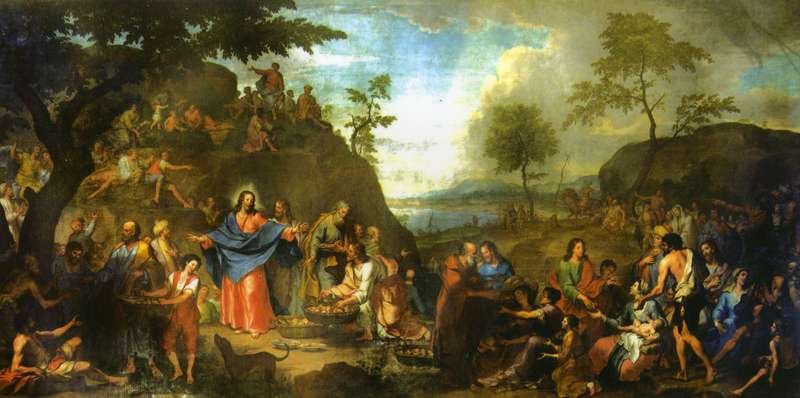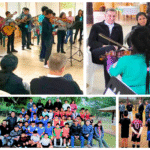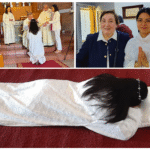
by f. Luis Casasús, General Superior of the Idente missionaries
New York, June 23, 2019. The Most Holy Body and Blood of Christ. Solemnity.
Book of Genesis 14,18-20; First Letter to the Corinthians 11,23-26; Saint Luke 9,11b-17.
When a person is sick and at certain moment says that she or he is hungry, we experience relief, because food is naturally associated to life. So we can understand why Jesus says, I am Life, and then in the Eucharist gives us a clear message in the bread and wine declaring: this is my body, this is my blood.
This reveals how serious sin is that He should need to die for our sins; and assures us of our sins being forgiven when we trust in His death in our place. In our Holy Communion we have the opportunity of bringing the power and the importance of Christ’s death into our current lives, by remembering and by enjoying a very especial form of His presence.
Why did God in his providence choose bread and wine to be an acceptable offering?
The bread we use is comprised simply of wheat and water. The wine is made of grapes from the vine. Wheat, grapes, and water are gifts to us from the earth and ultimately are gifts from God. These basic ingredients become bread and wine through human effort (fruit of the earth and work of human hands; fruit of the vine and work of human hands). We take these gifts and we put our lives into them. We become part of the bread and wine. By eating the body and drinking the blood of Christ we accept his invitation to identify ourselves with him.
One of the most relevant things we can do as human beings and also as Christians is: to remember. When we remember, the power of the past comes into the present, impacts our present and shapes our future. Whether it be the terror and tragedy of a violent event; or the joy of a loved family member evoked by a photograph. The most important and powerful thing God has done is sent Jesus to die in our place, this is why Savior and Redeemer are synonymous with Jesus Christ. That is worth remembering.
But further still, it is necessary to distinguish between remembering, which is of a psychological order and the memorial, which is organized and celebrated.by a community. It involves a meeting, gathering the participants to commemorate an event they do not wish to forget, something they want to retain and influence in their present life to insure continuity between the past and the present. A memorial meal is a way of appropriating history, to put it at the service of the present.
We must recall that the Jewish understanding of a memorial is a remembrance that makes present. When Jesus says, Do this in memory of me, he is saying, On the day you do this, that day I will be with you. He continues to give himself to us in the Eucharist. When we pray, Lord, remember your church …, we are saying, Lord, be present to our church, to our brothers and sisters; Lord, be present to those who have died.
By instructing his disciples to feed the crowd, he teaches them to have faith and invites them to share in his concern for those in need. In the multiplication of the loaves and fishes we see a sign and a symbol of what God always does. When God gives, he gives abundantly. He gives more than we need for ourselves so that we may have something to share with others as well, especially those who lack what they need. God takes the little we have and multiplies it for the good of others.
When I broke the five loaves for the five thousand, how many wicker baskets full of fragments you picked up?” They answered him, “Twelve.” “When I broke the seven loaves for the four thousand, how many full baskets of fragments did you pick up?” They answered him, “Seven.” He said to them, “Do you still not understand?” (Mk 8 19-21).
The numbers in the Bible mean more than what we might first think. Especially to Jews, numbers had deep symbolic meaning and this is the case here as well. 12 is a symbol of the 12 tribes of Israel, whom Jesus has come to save. 7 is a symbol of the 7 tribes of Canaan who lived alongside Israel and to whom the Gospel message is also intended to serve. Thus, he is telling them that as Messiah, he has a universal mission to all people.
But, the disciples still do not understand and they will continue to struggle with understanding the true nature and mission of Jesus until Pentecost.
It is unfortunate, but we are not always aware of the significance of receiving the Body and Blood of Christ. His presence in his entire being:
Once there was a poor man living outside a village in a small hut. Everyday he went to the village to beg for his food. One day a holy man was passing that way and it was evening. Hence he took rest in the hut of the poor man. Next day as he was leaving, he called the poor man and said: Under your hut there are precious diamonds. Dig deep down and you will find them. The poor man believed the message of the holy man, dug in the hut and found the diamonds. Henceforth he stopped going to the village to beg, enjoyed his treasure and used it to help the poor people whom he knew.
Jesus himself told a parable where He speaks about a hidden treasure, illustrating our inability to discover the very best of our lives, particularly the real foretaste of heaven and the real fellowship with one another that we are called to experience in the Eucharist… the hidden treasure under our hut.
Likewise, we do not actually have an awareness of how many people are still crippled, blind and dumb. Some of us are dazzled by the power or the weakness, the sin or he virtue, the wisdom or the ignorance, the joy or the sadness of those around us. And we fail to listen to Jesus’ instruction about how our relationship with them should be: Give them some food yourselves. Indeed, when we experience His love and presence in our lives, we will be so filled with His compassion and love that we feel the call to feed His people who are hungry for spiritual food and the presence of God. Yes, we are all called to bring heaven down to earth for all so that anticipating the joy of heaven, they too will look to that fullness of Christ’s coming in His glory at the end of time. The only condition is: Do whatever he tells you (Mk 2: 19).
The Eucharist makes me attentive to all forms of hunger of the brothers and sisters: hunger for bread, hunger for love, hunger for understanding, hunger for forgiveness and above all hunger for God.
Saint John Paul II said that on our journey Jesus goes before us, with the gift of himself to the point of sacrifice and offers himself to us as nourishment and support. Indeed, he does not cease to repeat to us in all the ages: Give them something to eat, break this bread of eternal life for everyone. A demanding and exalting task. A mission that lasts until the end of time.
How does the Eucharist transforms and strengthens our spiritual life? We can see this in the lives of the first disciples, who, in the face external and internal of challenges, were faithful to the mission they received from Christ when He was no longer with them.
* First of all, we have to contemplate and to meditate about the reality of God’s deep love for us: the life I now live in the flesh I live by faith in the Son of God, who loved me and gave himself for me (Gal 2: 20). In fact, everything that we have today are gifts of God of which we own none. Every good and perfect gift comes from the Holy Spirit. And, above all, we receive God’s forgiveness over and over.
* And second, in the sacrifice of the Mass we are reminded that suffering, sacrifice, is part of our calling in this life as followers of Jesus: And now you see me a prisoner already in spirit; I am on my way to Jerusalem, but have no idea what will happen to me there, except that the Holy Spirit, in town after town, has made it clear enough that imprisonment and persecution await me (Act 20: 22-23). It is always wise, when you are the person suffering, to ask yourself the question, What is God trying to tell me through this? The existence of suffering is a mystery that we all have to deal with.
It is not always easy to react positively to the trials that are encountered in the journey through life. Discouragement comes to the surface when painful news is received … news such as the illness or death of a loved one, calumnies, the deprivation of goods that one deems to be necessary. At least, we know that suffering is not eternal. On the other hand, the experience of pain refines one’s sensitivity and understanding of others who find themselves in a similar situation and this is important for those who are called to positions of responsibility in the community.
Today, we are asked to examine our conscience as to how we have made use of this precious Sacrament the Lord has blessed us with to fulfill our mission in this world.
In the history of the saints we find examples of true faith in the real presence of Christ in the Eucharist.
In the 3rd century, St. Tarcisius was a twelve-year-old boy and an altar server. Being a time of persecution, they could not celebrate Mass openly as we do, so they went underground, in the Catacombs of Rome. After Mass, they chose Tarcisius to take Communion to someone who could not attend. The priest placed the consecrated Host in a special container, that Tarcisius held under his robe, near his heart. On the way some boys were playing ball. Needing an extra player, they called Tarcisius to join them. When he said he could not, they asked him what he was holding. The priest had told Tarcisius that could not show the “Sacred Mysteries” to unbelievers. The boys gathered around him and began to taunt him. As he held the Host tightly, the boys became furious, hitting and kicking Tarcisius. Eventually a man came who shouted and chased the boys away. Tarcisius was beaten so badly the man had to pick him up. He died on the way and was buried in the Cemetery of St. Callixtus. He is the patron saint of altar servers and first communicants.
Like Tarcisius, many Christians have given their lives for the Eucharist, not just in the early centuries, but in modern times. In many wars along the XX century, in jails and concentration camps, priests celebrated secret Masses so they and other prisoners could receive Communion.
When Jesus orders the twelve to feed the crowds, the first reaction of the twelve is amazement, surprise, the feeling of being called to a tremendous, absurd, impossible undertaking. Thus they advance a proposal that contradicts the line expressed by the Master. They suggest to send the people home, to push them away, to disperse. Everyone thinks of solving his own problems as best he can.
The disciples do not realize the gift that Jesus is going to deliver in their hands, they do not understand that his blessing will multiply endlessly this food that satisfies every hunger: the hunger for happiness, love, justice, peace, the need to give meaning to life. And this is also our own reaction
It is about the so urgent uncontrollable needs that at times push people to feed on what does not satisfy, what can actually exacerbate hunger or cause nausea. For this the Master insists: it is from you that the world is waiting for food, you yourselves give them something to eat.
His Word is a bread that miraculously multiplies: who accepts the Gospel and nourishes one’s life with it, who assimilates the person of Christ feeding on the eucharistic bread in turn feels the need to make the others sharers in his own discovery and joy. He starts to distribute also to them the bread that satisfied his own hunger. An unstoppable process of sharing is triggered and the twelve baskets of leftover remains always filled and ready for redistribution. The more people feed themselves of the bread of the Word of Christ and of the Eucharist the more the bread distributed to the hungry multiplies.
We should not forget that the eucharistic bread is a gift, not a well-deserved award and reserved for the good ones. It is a food offered to sinners, not the righteous. Although we realize that we are unworthy, we continue to approach the Eucharistic banquet. It reminds us of our sinfulness and urges us to become what we are not yet: bread broken and wine poured for the brothers and sisters.











